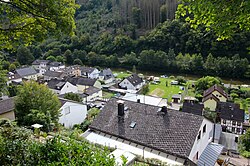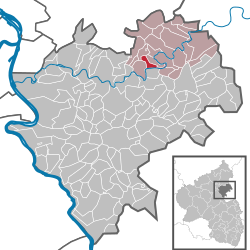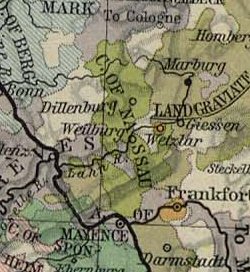
The County of Nassau was a German state within the Holy Roman Empire and later part of the German Confederation. Its ruling dynasty, the male line of which is now extinct, was the House of Nassau.
Rhein-Lahn-Kreis is a district (Kreis) in the east of Rhineland-Palatinate, Germany. Neighboring districts are Westerwaldkreis, Limburg-Weilburg, Rheingau-Taunus, Mainz-Bingen, Rhein-Hunsrück, Mayen-Koblenz, and the district-free city Koblenz.

Katzenelnbogen is the name of a castle and small town in the district of Rhein-Lahn-Kreis in Rhineland-Palatinate, Germany. Katzenelnbogen is the seat of the Verbandsgemeinde Aar-Einrich.
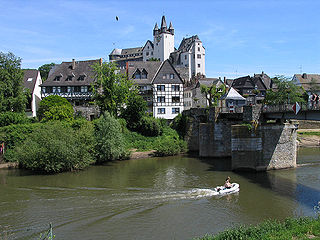
Diez an der Lahn is a town in Germany's Rhein-Lahn district in Rhineland-Palatinate, on the borders of Hesse. Diez is the administrative seat of the municipality of Diez.

Lahnstein is a verband-free town of Rhein-Lahn-Kreis in Rhineland-Palatinate, Germany. It is situated at the confluence of the Lahn with the Rhine, approximately 6 kilometres (3.7 mi) south of Koblenz. Lahnstein was created in 1969 by the merger of the previously independent towns of Oberlahnstein on the south side of the Lahn and Niederlahnstein on the north side. In 2020, it had a population of 18,030.

Nassau is a town located in the German state of Rhineland-Palatinate. It lies on the lower course of the Lahn River, on the mouth of the Mühlbach, between Limburg an der Lahn and the spa town of Bad Ems, and is located in the Nassau Nature Park, surrounded by the Westerwald to the north and the Taunus to the south. The town is on the German-Dutch holiday road, the Orange Route. As of 2021, it had a population of 4,592.

Nassau Castle, located in Nassau, Rhineland-Palatinate, Germany, was the original seat of the House of Nassau. The ruins of the castle are situated on a rock outcropping about 120 m (390 ft) above the Lahn River. The House of Nassau was an aristocratic dynasty among whose descendants are the present-day monarchy of the Netherlands and Luxembourg.
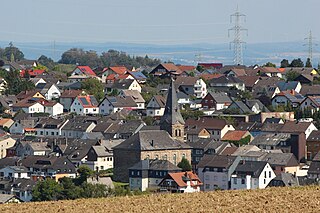
Holzappel is a municipality in the Rhein-Lahn-Kreis, Rhineland-Palatinate, Germany, with a population in 2006 of 1100. It belongs to the association community of Diez.

Hundsangen is an Ortsgemeinde – a community belonging to a Verbandsgemeinde – in the Westerwaldkreis in Rhineland-Palatinate, Germany.

Aull is a municipality in the district of Rhein-Lahn, in Rhineland-Palatinate, in western Germany. It belongs to the association community of Diez.

Cramberg is a municipality in the Nassau Nature Park in the district of Rhein-Lahn, in Rhineland-Palatinate, in western Germany. It belongs to the association community of Diez.

Hambach is a municipality in the district of Rhein-Lahn, in Rhineland-Palatinate, in western Germany. It belongs to the association community of Diez.

Lipporn is a municipality in the district of Rhein-Lahn, in Rhineland-Palatinate, in western Germany. It is notable for Dudo of Laurenburg, a 12th-century Lord of Lipporn, who was a founder of the House of Nassau, an aristocratic dynasty in Europe that includes the monarchs of the Netherlands.
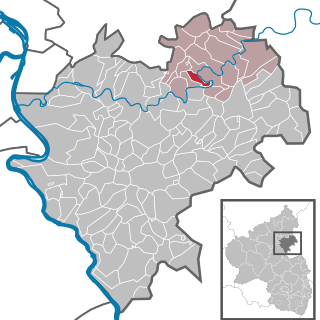
Scheidt is a Ortsgemeinde, in the municipal association of Diez in the district of Rhein-Lahn, in Rhineland-Palatinate, in western Germany.

Seck is an Ortsgemeinde – a community belonging to a Verbandsgemeinde – in the Westerwaldkreis in Rhineland-Palatinate, Germany.
Dudo of Laurenburg was probably Count of Laurenburg and is considered the founder of the House of Nassau. The House of Nassau would become one of the reigning families in Germany, from which are descended through females the present-day royals of the Netherlands and Luxembourg, while officially belonging to this House.

Schönau Abbey is a monastery in the Roman Catholic Diocese of Limburg on the outskirts of the municipality of Strüth in the Rhein-Lahn district, Rhineland-Palatinate, Germany. It is often referred to as Schönau Abbey of Nassau or Schönau Abbey in Taunus, in order to differentiate it from the other Schönau Abbey in Baden-Württemberg. This Schönau Abbey is most well known as the convent of St. Elizabeth of Schönau.
The County of Holzappel was an immediate state of the Holy Roman Empire, located in the present German state of Rhineland-Palatinate.

Elisabeth Charlotte Melander, was Countess of Holzappel from 1648 to 1707 and Schaumburg from 1656 to 1707.

Frankenstein Castle is a medieval fortification on a spur above the village of Frankenstein, Rhineland-Palatinate in the Palatinate Forest in Germany. Its name derives from the local House of Frankenstein.
